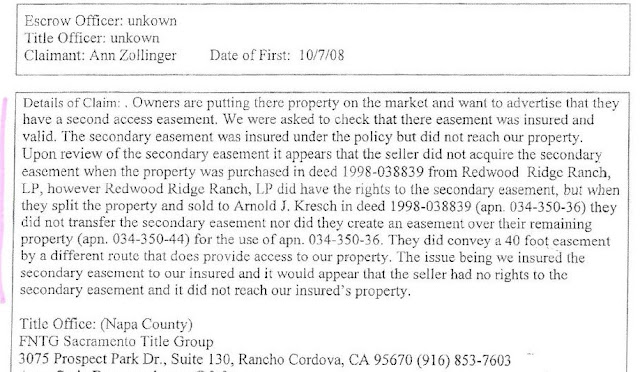In May 2008 I listed the property for sale and contacted all of the adjacent property owners whose properties the easements crossed that I would be crossing their properties. (I had been working on other properties and had not even been to this property in three years until we started getting it ready to put on the market.)
When I contacted the owner of the first property for the access off Mt. Veeder Road the new owner of the property questioned my right to cross her property. I sent her the copy of my Prelim with the parcels listed and the descriptions I had received from the Fidelity National Title Company title officer prior to purchasing the property. She did meet me at the gate from Mt. Veeder and the two of us traversed the easement to the adjacent property. The road through her property passed her pond and vineyard but the home was not visible from the road.
She told me that it was her understanding that I did not have an easement and she was checking with her attorney and title officer. I did have the opportunity to show the easement to my real estate agent with the owner's permission but we had to access it from the interior property as the owner never gave me the gate code. Prior to her title officer confirming that we did not have an easement we had been marketing the property with the two deeded easements from Mt. Veeder Road - this easement through residential property and the other through the commercial/manufacturing property.
After her Title Officer stated that the easement was not valid I immediately contacted my Fidelity National Title escrow officer with the problem.
On October 9, 2008 a Fidelity National Title Company title officer wrote I believe to his boss, "We have asked to issue a pre that Fidelity has insured previously insuring appurtenant easements that do not reach our properties through adjacent properties. The good new is our property does have access by other means but not by the insured appurtenant easement. Our insured is now putting the property on the market and wants to advertise that she has and additional access (being the insured easement). I know we need to forward to the claims department, but escrow wants to know what she should advise her customer. I think we should be up front and let her know the facts and that it will be handled by the claims department. Please advise."
The addressee responded, "Your response is the correct one. You should inform the insured that the matter is being referred to claims counsel and that they will be hearing from claims counsel."
The following Confidential Claim Report to General Counsel was filed:
I would never use Fidelity National Title Insurance Company to protect my real estate. A claim was filed with Fidelity for me by their Title Officer for the loss of a mile long easement to 80 acres with views of the famous Napa Valley in California. Fidelity valued the loss at $0 by a Boise Idaho appraiser. After suing Fidelity I was forced to settle for a fraction of the loss. I question whether Fidelity National Title Insurance Company acted in Good Faith in the handling of my claim.

No comments:
Post a Comment